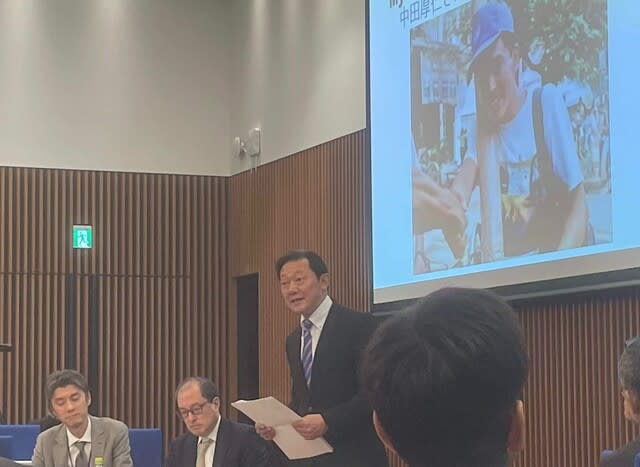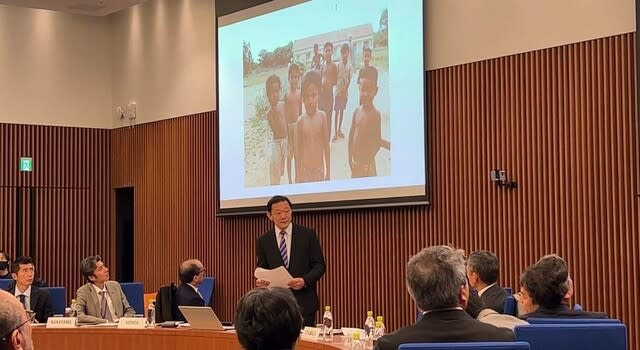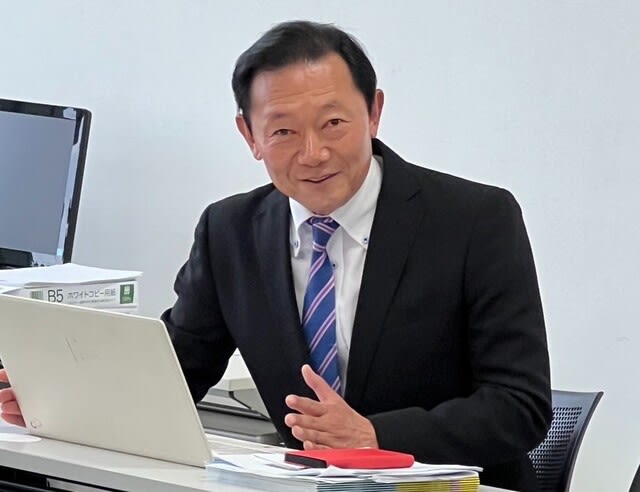今日4月8日はUNTAC(国連カンボジア暫定統治機構)で、自由・公正なカンボジアの選挙の実施のために活動していた中田厚仁さんが銃撃を受けて亡くなってから30年になります。
京都芸術大学、外務省、国連ボランティア計画が『中田厚仁30年平和フォーラム』を実施し、私は基調講演を行いました。UNTACの特別代表を務めた明石康氏など、国連や各国政府で活躍する平和構築、平和外交のエキスパートが参加される中、約40分、お話ししましたが、皆さんの途切れることのない熱心な視線を感じ、私の問題提起が基点になって、民主化支援の在り方や、日本の平和貢献の在り方など様々な議論がなされました。このような機会を作れたことを本当にありがたく思います。
下記の様なテーマでお話ししました。
1:中田さんの足跡をまとめた絵本『中田厚仁物語-夢は世界を平和にすること』を通して中田厚仁さんのパーソナリティーの紹介。この絵本はクメール語研修の2か月間、ルームメートだった時に直接聞いた彼の言葉を引用して編集し、すでにカンボジアと日本で約3500部配布されている。
2:自由で公平な選挙の実施のために命を懸けた彼の遺志を継ぐ活動として、衆議院議員として、カンボジアの選挙制度改革に取り組んだ。有権者登録のプロセスに二重登録などの不正が起こり得ること、それをコンピューター化することで不正を防ぎ得ることを国会で提案した。その結果、コンピューター化に生体認証機能も加え、自由公正な選挙を行う制度的基盤はできた。
しかし、カンボジアでは2017年に野党第1党・救国党は国家転覆を図ったとして解党させられた。変化を望む国民が投票する政党がなくなり2018年の選挙で与党人民党が125議席全てを獲得した。カンボジアの民主主義は危機的状態にある。
3:彼が人生の終焉を迎えた場所にできたナカタアツヒト村と『アツ学校』の現状を紹介。現在は小学生300人、中学生が130人学んでいる。貧困のため学校に通えない子どもも多いため、NGOインターバンドは補習授業実施のための支援をしている。
4:日本の平和貢献の在り方について問題提起を行った。特にカンボジアの選挙制度改革による学びを、同じような選挙プロセスの不正が民主化の阻害要因になっているミャンマーなど第三国にどのように応用して実行するか問いかけた。
中国の影響もあり、民主化しなくても豊かになれると考える国が増えています。どのように民主主義の質を向上させ、ひとりひとりを幸せにするシステムに進化させるか、これは今後の大きな課題です。この2日間一緒に考えていきましょう!
講演はパワーポイントを使って行いましたが、近く、日本語で、オープンな形でオンライン講演を行いたいと思います。また、私が理事を務めるインターバンドはこの7月23日に行われるカンボジア総選挙に選挙監視ミッションを派遣し、『ナカタアツヒト村』を含む地域で選挙監視を行います。今回インターバンドからボランティアとして参加してくれた人々が中心的な役割を果たす見込みですが、一般の方々にも参加して頂ければと思います。市民による選挙監視ミッション、一緒に作っていきましょう!
Today, April 8, marks the 30th anniversary of the shooting death of Atsuhito Nakata, who worked for UNTAC (United Nations Transitional Authority in Cambodia) to implement free and fair elections in Cambodia.
Kyoto University of Arts, the Ministry of Foreign Affairs, and the United Nations Volunteer Program conducted the "Nakata Atsuhito 30th Anniversary Peace Forum," at which I was the keynote speaker.
I spoke for about 40 minutes in the presence of experts in peacebuilding and peace diplomacy working for the UN and various governments, including Mr. Yasushi Akashi, who served as UNTAC's Special Representative. I felt everyone's uninterrupted and enthusiastic gazes on me, and my presentation of issues served as a starting point for various discussions, including how we should support democratization and how Japan should contribute to peace. I am very grateful for this opportunity.
I spoke on the following themes.
1: Introduction of Mr. Nakata's personality through his picture book "Nakata Atsuhito Story: My Dream is to Make the World Peaceful," which summarizes his footsteps. This picture book was edited with quotes from his words that I heard directly from him when we were roommates during the two months of Khmer language training. About 3,500 copies have already been distributed in Cambodia and Japan.
2: As a member of the House of Representatives, I worked to reform Cambodia's electoral system as an activity to continue his legacy of risking his life for the implementation of free and fair elections.
I proposed to the National Assembly that the voter registration process could be subject to fraud, including double registration, and that computerization of the process could prevent fraud. As a result, the institutional basis for free and fair elections was established, with the addition of biometric functions.
However, in 2017, Cambodia's first opposition party, the National Rescue Party, was disbanded for attempting to overthrow the state. The people who wanted change no longer had a party to vote for, and the ruling Cambodia People’s Party won all 125 seats in the 2018 election. Cambodia's democracy is in crisis.
3: The current situation of Nakata Atsuhito village and "Atsu
School" which was established in the place where he ended his life.
Currently, 300 elementary school students and 130 junior high school students are studying there. Since many children are unable to attend school due to poverty, the NGO Interband is supporting the implementation of supplementary classes.
4: I raised the issue of how Japan should contribute to peace. In particular, I asked how the lessons learned from Cambodia's electoral reform could be applied and implemented in third countries, such as Myanmar, where similar electoral process irregularities have been an obstacle to democratization.
China's influence has led me to believe that more and more countries are thinking that they can be prosperous without democratization. How to improve the quality of democracy and evolve it into a system that makes each individual happy is a major challenge for the future. Let us think about this together during these two days!






京都芸術大学、外務省、国連ボランティア計画が『中田厚仁30年平和フォーラム』を実施し、私は基調講演を行いました。UNTACの特別代表を務めた明石康氏など、国連や各国政府で活躍する平和構築、平和外交のエキスパートが参加される中、約40分、お話ししましたが、皆さんの途切れることのない熱心な視線を感じ、私の問題提起が基点になって、民主化支援の在り方や、日本の平和貢献の在り方など様々な議論がなされました。このような機会を作れたことを本当にありがたく思います。
下記の様なテーマでお話ししました。
1:中田さんの足跡をまとめた絵本『中田厚仁物語-夢は世界を平和にすること』を通して中田厚仁さんのパーソナリティーの紹介。この絵本はクメール語研修の2か月間、ルームメートだった時に直接聞いた彼の言葉を引用して編集し、すでにカンボジアと日本で約3500部配布されている。
2:自由で公平な選挙の実施のために命を懸けた彼の遺志を継ぐ活動として、衆議院議員として、カンボジアの選挙制度改革に取り組んだ。有権者登録のプロセスに二重登録などの不正が起こり得ること、それをコンピューター化することで不正を防ぎ得ることを国会で提案した。その結果、コンピューター化に生体認証機能も加え、自由公正な選挙を行う制度的基盤はできた。
しかし、カンボジアでは2017年に野党第1党・救国党は国家転覆を図ったとして解党させられた。変化を望む国民が投票する政党がなくなり2018年の選挙で与党人民党が125議席全てを獲得した。カンボジアの民主主義は危機的状態にある。
3:彼が人生の終焉を迎えた場所にできたナカタアツヒト村と『アツ学校』の現状を紹介。現在は小学生300人、中学生が130人学んでいる。貧困のため学校に通えない子どもも多いため、NGOインターバンドは補習授業実施のための支援をしている。
4:日本の平和貢献の在り方について問題提起を行った。特にカンボジアの選挙制度改革による学びを、同じような選挙プロセスの不正が民主化の阻害要因になっているミャンマーなど第三国にどのように応用して実行するか問いかけた。
中国の影響もあり、民主化しなくても豊かになれると考える国が増えています。どのように民主主義の質を向上させ、ひとりひとりを幸せにするシステムに進化させるか、これは今後の大きな課題です。この2日間一緒に考えていきましょう!
講演はパワーポイントを使って行いましたが、近く、日本語で、オープンな形でオンライン講演を行いたいと思います。また、私が理事を務めるインターバンドはこの7月23日に行われるカンボジア総選挙に選挙監視ミッションを派遣し、『ナカタアツヒト村』を含む地域で選挙監視を行います。今回インターバンドからボランティアとして参加してくれた人々が中心的な役割を果たす見込みですが、一般の方々にも参加して頂ければと思います。市民による選挙監視ミッション、一緒に作っていきましょう!
Today, April 8, marks the 30th anniversary of the shooting death of Atsuhito Nakata, who worked for UNTAC (United Nations Transitional Authority in Cambodia) to implement free and fair elections in Cambodia.
Kyoto University of Arts, the Ministry of Foreign Affairs, and the United Nations Volunteer Program conducted the "Nakata Atsuhito 30th Anniversary Peace Forum," at which I was the keynote speaker.
I spoke for about 40 minutes in the presence of experts in peacebuilding and peace diplomacy working for the UN and various governments, including Mr. Yasushi Akashi, who served as UNTAC's Special Representative. I felt everyone's uninterrupted and enthusiastic gazes on me, and my presentation of issues served as a starting point for various discussions, including how we should support democratization and how Japan should contribute to peace. I am very grateful for this opportunity.
I spoke on the following themes.
1: Introduction of Mr. Nakata's personality through his picture book "Nakata Atsuhito Story: My Dream is to Make the World Peaceful," which summarizes his footsteps. This picture book was edited with quotes from his words that I heard directly from him when we were roommates during the two months of Khmer language training. About 3,500 copies have already been distributed in Cambodia and Japan.
2: As a member of the House of Representatives, I worked to reform Cambodia's electoral system as an activity to continue his legacy of risking his life for the implementation of free and fair elections.
I proposed to the National Assembly that the voter registration process could be subject to fraud, including double registration, and that computerization of the process could prevent fraud. As a result, the institutional basis for free and fair elections was established, with the addition of biometric functions.
However, in 2017, Cambodia's first opposition party, the National Rescue Party, was disbanded for attempting to overthrow the state. The people who wanted change no longer had a party to vote for, and the ruling Cambodia People’s Party won all 125 seats in the 2018 election. Cambodia's democracy is in crisis.
3: The current situation of Nakata Atsuhito village and "Atsu
School" which was established in the place where he ended his life.
Currently, 300 elementary school students and 130 junior high school students are studying there. Since many children are unable to attend school due to poverty, the NGO Interband is supporting the implementation of supplementary classes.
4: I raised the issue of how Japan should contribute to peace. In particular, I asked how the lessons learned from Cambodia's electoral reform could be applied and implemented in third countries, such as Myanmar, where similar electoral process irregularities have been an obstacle to democratization.
China's influence has led me to believe that more and more countries are thinking that they can be prosperous without democratization. How to improve the quality of democracy and evolve it into a system that makes each individual happy is a major challenge for the future. Let us think about this together during these two days!















